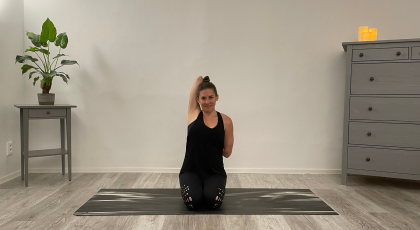View basket (0 items $0.00)
Error message
- Notice: unserialize(): Error at offset 5 of 154 bytes in variable_initialize() (line 1202 of /home/dh_6hcdc2/yogau.online/docroot/includes/bootstrap.inc).
- The file could not be created.
- The file could not be created.

What Your Body Tells You Can Protect You From Stress, Study Suggests
Wellness doesn't come from the outside. It comes from a deep level of self-awareness of what makes us feel better and what not.
This is also referred to as interoception, i.e. the capacity to accurately detect and interpret bodily cues. Some of these cues are obvious, such as when you accidentally touch a hot surface. But interoception also involves being aware of the body’s more subtle signals.
Research now suggests that the more sensitive you are to those signals, the greater your ability to cope effectively with stress may be.
Interoception allows us to respond to, and learn from the myriad signals about our current state that the body sends to the brain. According to a study published in Biological Psychology, those with poor interoceptive awareness may be less able to adapt to stressful situations. Yoga, which emphasizes the integration of mind and body, may help to cultivate greater interoceptive ability and increase stress resilience.
Study Shows Benefits of Interoception
The study examined how participants’ brains responded to stress when exposed to aversive sensations. Forty-six adults were divided into either a high, medium or low resilience group based self-reports of their ability to cope with stress and adversity. Group participants were matched for age, education, and gender.
People with current drug or alcohol dependence, history of brain injury, current use of psychoactive drugs or substances that affect a hemodynamic response, neurological or severe psychiatric disorders or other factors preventing them from functional magnetic resonance imaging (fMRI) assessment were excluded from the study.
During a laboratory visit, individuals completed questionnaires regarding their interoceptive awareness and responsiveness to bodily sensations. They were then fitted with a nose clip and asked to breathe into a mouthpiece attached to an apparatus that elicited respiratory stress, or “breathing load”. Participants then performed a simple attention task that required pressing either a left or right arrow button in response to an arrow presented on a screen.
During this task they were also given cues as to when they might anticipate a breathing load to assess their anticipatory reaction to physiological stress. Neural responses were recorded using functional magnetic resonance imaging (fMRI).
Results showed that participants in the low resilience group reported decreased interoceptive awareness compared to those who endorsed medium or high resilience to stress. Brain scans showed that low resilience individuals also demonstrated greater activation in brain regions including the insula and thalamus when anticipating stress compared to highly resilient participants. This suggests that those with poor interoception have difficulty processing stressful information.
The study’s authors suggest that a decreased awareness of bodily signals (interoceptive awareness) may leave individuals with lower levels of resilience and greater susceptibility to stress due to a limited capacity to accurately monitor bodily states or predict future needs. This means that adults with attenuated body awareness may be more likely to interpret life events as stressful and less able to enact effective coping strategies.
This research suggests that the modulation of brain systems that process interoceptive information may be necessary to effectively manage life stress. What’s more, individuals with low interoceptive capacity may benefit from stress-reduction interventions that involve yoga or another mindfulness-based movement that emphasizes body awareness.
Can Yoga Help Develop Interoception?
Movement-based mindfulness practices including yoga, tai chi, and Qi gong draw attention to the mind-body relationship through the conscious integration of awareness, breath and movement.
These tools may help to strengthen interoceptive capability by cultivating greater sensitivity to the link between bodily sensation and cognitive and affective expression and thus enhance one’s ability to recognize, interpret and effectively respond to stress-related bodily cues.
Every time you go to your mat, you are essentially fostering a closer relationship between body and mind and developing your interoceptive skills.
Are some practice approaches better than others? Research on interoception and yoga is still in its early stages. But experientially, many people feel that savoring your practice in a slower, more mindful approach offers more opportunity to sense what happens in body and mind during each pose. And importantly, don't forget the all important gap between poses, where some of the most important mind-body integration takes place. Try it for yourself and see what you notice!
 B Grace Bullock, Ph.D., E-RYT 500 is a psychologist, research scientist, educator, yoga and mindfulness expert and author of Mindful Relationships: Seven Skills for Success - Integrating the Science of Mind, Body and Brain. Her mission is to reduce stress, increase health and well-being and improve the quality of relationships. She offers classes, workshops, writing and research that combine the wisdom of applied neuroscience, psychophysiology, psychology and contemplative science and practice. Her goal is to empower individuals, groups, leaders and organizations to reduce chronic stress and increase awareness, attention, compassion, mindfulness and effective communication to strengthen relationships, release dysfunctional patterns and unlock new and healthy ways of being. Dr. Bullock is also the Founding Director and Principal Consultant of the International Science & Education Alliance, an organization devoted to exceptional research, program evaluation, assessment design, strategic planning, and capacity building to support equity, programmatic diversity and scientific integrity, and promote effective leadership, decision-making, and social change. Bullock is a Certified Viniyoga Therapist and Faculty at the Integrated Health Yoga Therapy (IHYT) Training program. She is the former Senior Research Scientist at the Mind & Life Institute and former Editor-in-Chief of the International Journal of Yoga Therapy. For more information see www.bgracebullock.com.
B Grace Bullock, Ph.D., E-RYT 500 is a psychologist, research scientist, educator, yoga and mindfulness expert and author of Mindful Relationships: Seven Skills for Success - Integrating the Science of Mind, Body and Brain. Her mission is to reduce stress, increase health and well-being and improve the quality of relationships. She offers classes, workshops, writing and research that combine the wisdom of applied neuroscience, psychophysiology, psychology and contemplative science and practice. Her goal is to empower individuals, groups, leaders and organizations to reduce chronic stress and increase awareness, attention, compassion, mindfulness and effective communication to strengthen relationships, release dysfunctional patterns and unlock new and healthy ways of being. Dr. Bullock is also the Founding Director and Principal Consultant of the International Science & Education Alliance, an organization devoted to exceptional research, program evaluation, assessment design, strategic planning, and capacity building to support equity, programmatic diversity and scientific integrity, and promote effective leadership, decision-making, and social change. Bullock is a Certified Viniyoga Therapist and Faculty at the Integrated Health Yoga Therapy (IHYT) Training program. She is the former Senior Research Scientist at the Mind & Life Institute and former Editor-in-Chief of the International Journal of Yoga Therapy. For more information see www.bgracebullock.com.
Featured Courses








